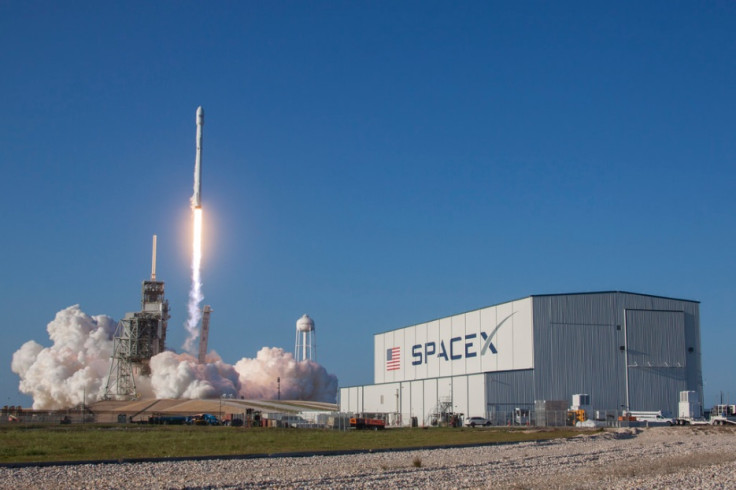SpaceX celebrates 'revolution in spaceflight' after historic used rocket flight
CEO Elon Musk described the accomplishment as a "milestone in the history of space".

SpaceX made aerospace history on Thursday (30 March) with the successful first launch and landing of a "used" Falcon 9 rocket - a major achievement that could help slash the cost of space travel. The Falcon 9 rocket lifted off from the Kennedy Space Center in Florida carrying an SES-10 communications satellite into orbit for the Luxembourg-based company SES.
The rocket's first stage, or booster, was previously used to propel an unmanned Dragon cargo ship to the International Space Station in April 2016 before it successfully landed on a droneship in the Atlantic Ocean.
A few minutes after Thursday's launch at 6:37pm local time, the booster separated from its payload and sank down towards Earth before landing right in the centre of the landing-pad bullseye on the droneship "Of Course I Still Love You" in the Atlantic. The impressive feat drew ecstatic cheers at SpaceX's mission control centre in Hawthorne, California.
"My mind's blown," SpaceX CEO Elon Musk said, describing the accomplishment as a "milestone in the history of space".
"This is going to be ultimately a huge revolution in spaceflight," Musk said immediately after the booster's second successful landing. "It's the difference between if you had airplanes where you threw away an airplane after every flight versus you could reuse them multiple times.
"It's taken us a long time, a lot of difficult steps along the way, but I'm just incredibly proud of the SpaceX team," he said. "I'm still at a loss for words, but it's really a great day not just for SpaceX and the space industry as a whole and proving that something can be done that many people said was impossible."
Musk has long argued that that reusing rockets effectively will rapidly revolutionise the space industry and open up an era of cheaper space access. Up until now, millions of dollars worth of rocket parts are usually discarded after every launch.
"The potential is there for [an] over 100-fold reduction in the cost of access to space," Musk said. "If we can achieve that, it means humanity can become a space-faring civilization and be out there among the stars. This is what we want for the future."
Congrats @SpaceX on another historic launch! Our iconic launch pads at @NASAKennedy continue to support the growing commercial space economy https://t.co/bzNxI0lI7G
— NASA (@NASA) March 30, 2017
Incredibly proud of the SpaceX team for achieving this milestone in space! Next goal is reflight within 24 hours.
— Elon Musk (@elonmusk) March 30, 2017
"This launch has a historic value. A lot of people thought it was impossible. And today she showed that 'hey it works'! " @elonmusk, @SpaceX
— SES (@SES_Satellites) March 30, 2017
SpaceX aims to eventually cut its costs by around 30% with the reuse of its rockets. The company, which has a backlog of 70 missions worth more than $1bn, plans to launch a rocket every two to three weeks from the new launch pad at the Kennedy Space Center.
SES received a discount for SpaceX's use of a recycled rocket booster for the launch of its communications satellite, but did not specify how much. A Falcon 9 launch typically costs around $62m (£49.8m) each.
Musk said the space transportation firm spent at least $1bn developing the technology to land and relaunch its rockets. The company's boosters are expected to be able to be redeployed ten times with no refurbishment and about 100 times with moderate reconditioning, he added.
The rocket booster that was launched on Thursday, however, will be donated to the Cape Canaveral Spaceport for display, he said.
SES Chief Technology Officer Martin Halliwell said the firm has three more launches with SpaceX coming up, two of which "may launch on a flight-proven booster as well".
"Within 24 months it will be so normal it will no longer matter if the launch is with a new rocket or a flight-proven booster," Halliwell said.
© Copyright IBTimes 2025. All rights reserved.





















